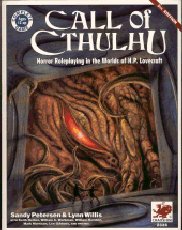
Chaosium’s Call of Cthulhu is the best RPG ever. FACT.
I’d heard of it through White Dwarf, back when Games Workshop acted as distributor for Chaosium in the UK, but I didn’t get to play it until 1992-93 when I joined a new gaming group and they had just begun the epic Masks of Nyarlothotep campaign (which annoyingly we never finished, as someone joined the group who’d already played it).
The game was developed by Sandy Petersen, now probably more well known for his involvement in Doom and Quake (did he lose his computer game review spot in Dragon due to his shameless hyping of iD games?). Lynn Willis took charge of development from the 5th edition onwards, which is where I came in.
Using Gregg Stafford and Willis’ Basic Role-Playing ruleset as its basis, CoC is a roleplaying game set in HP Lovecraft’s “Cthulhu Mythos”. The original game was set in 1920’s America, but by the 5th edition included alternate rules for 1890’s Britain (Cthulhu by Gaslight) and modern day (Cthulhu Now). The difference in the games with regards game mechanics lies in the skills players have access to and what the skills cover.
The main edition to the Basic Role-Playing ruleset that CoC provides and is pivotal to the game and it’s position in game design history is the concept of SANITY POINTS. It is a mechanic designed to simulate the erosion of sanity faced by Lovecraft characters when faced with mind bending cosmic horror. Characters lose sanity points as they see and learn THINGS MAN WAS NOT MEANT TO KNOW, lose too many too quickly and you face temporary or permanent mental problems. Lose them all, and your character is no longer playable, their mind eroded to such a extent that they are a gibbering wreck or an amoral sociopath.
Of course you may die before you get that far. The other thing CoC is known for is the frail nature of the characters in the face of creatures made of extra dimensional matter. Oh and bullets’ll do a number on you too.
Getting a true horror experience is hard, of the adventures I’ve run, only Pagan Publishing’s “Devil’s Children” really freaked my players out to the extent they had nightmares. However as a supernatural investigation game it can’t be beat. Or as a weird science game. Or as black comedy. It’s simplicity lends it to being pretty damn flexible.
In the 90’s Pagan brough out Delta Green, a X-Files-esque take on the material. It’s not that far a reach, Lovecraft’s Whisperer In The Darkness is remarkably prescient of the UFO-Government conspiracy paranoia that abounded in the 90s, and the core plot of the campaign builds from that story. It’s a great sourcebook, and it’s follow-up Countdown is arguably even better.